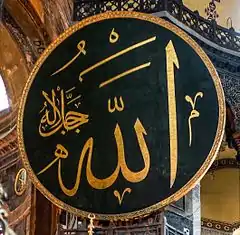Inshallah
Insha'Allah (Arabic: إِنْ شَاءَ ٱللَّٰهُ, ʾin šāʾa -llāh, [ɪnˈʃælə]), also spelled In sha Allah, is an Arabic language expression meaning "if God wills" or "God willing".[1] The term is mentioned in the Quran[Quran 37:102] and Muslims are commanded to use it when speaking on future events,[Quran 18:23–24] so it is also used to fulfill this Quranic command.[2] The phrase is commonly used by Muslims, Arab Christians, and Arabic-speakers of other religions to refer to events that one hopes will happen in the future.[3][4] It expresses the belief that nothing happens unless God wills it and that his will supersedes all human will.[3]
| Part of a series on |
| God in Islam |
|---|
 |
|
|
The phrase can take on an ironic context, implying that something will never happen and is left to God's hands, or can be used as a gentle way of declining invitations.[5]
Other languages
Persian
In Persian language the phrase is nearly the same, انشاءالله, being pronounced formally as en shâ Allah, or colloquially as eshâllâ.
Turkish
In Turkish, the word İnşallah or inşaallah is used in its literal meaning, "If God wishes and grants", but is also used in ironic context.
Urdu
In Urdu used meaning "God willing", but almost never used in the ironic context above.
Maltese
A similar expression exists in Maltese: jekk Alla jrid (if God wills it).[6] Maltese is descended from Siculo-Arabic, the Arabic dialect that developed in Sicily and later in Malta between the end of the 9th century and the end of the 12th century.
Iberian languages
In the Spanish and Portuguese languages from the Iberian Peninsula, regardless of the speaker's faith, the expressions ojalá (Spanish) and oxalá (Portuguese) are used. These words are derived from the Andalusian Arabic expression law šá lláh.[7]
Bulgarian and Serbian, Croatian and Bosnian
In Bulgarian, "Дай Боже", in Serbo-Croatian-Bosnian, "ако Бог даде" is the South Slav version of the expression, calqued from Arabic, owing to Ottoman rule over the Balkans, it is used extensively in Bulgaria and in the ex-Yugoslav countries of Bosnia and Herzegovina, Serbia, Croatia, Slovenia, North Macedonia, and Montenegro, even sometimes used by non theists. Also widely used in the Christian country of Ukraine.
See also
References
- Clift, Rebecca; Helani, Fadi (June 2010). "Inshallah: Religious invocations in Arabic topic transition". Language in Society. 39 (3): 357–382. doi:10.1017/S0047404510000199.
- Abdur Rashid Siddiqui (10 December 2015). Qur'anic Keywords: A Reference Guide. Kube Publishing Ltd. ISBN 9780860376767.
- John L. Esposito, ed. (2014). "Insha Allah". The Oxford Dictionary of Islam. Oxford: Oxford University Press. doi:10.1093/acref/9780195125580.001.0001. ISBN 9780195125580.
- Anthony Shadid (11 January 2010). "Allah – The Word". The New York Times.
- Ismail, Aymann (30 September 2020). "The One-Word Mystery of the Presidential Debate That Roused Muslims (and Right-Wing Bloggers)". Slate Magazine. Retrieved 30 September 2020.
- Azzopardi-Alexander, Marie; Borg, Albert (15 April 2013). Maltese. Routledge. ISBN 9781136855283.
- ASALE, RAE-; RAE. "ojalá | Diccionario de la lengua española". «Diccionario de la lengua española» - Edición del Tricentenario (in Spanish). Retrieved 28 August 2020.
External links
| Look up inshallah in Wiktionary, the free dictionary. |
